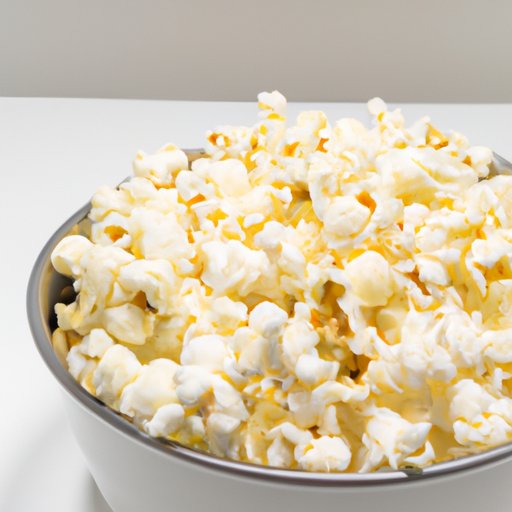Introduction
Popcorn has become an increasingly popular snack food over the years, thanks to its delicious flavor and convenience. But is popcorn really a healthy snack? In this article, we’ll explore the nutritional value of popcorn, the pros and cons of eating it, and how to incorporate it into a balanced diet.

Exploring the Nutritional Value of Popcorn
Popcorn is a whole grain food, which means it contains many important macronutrients and micronutrients. It’s a good source of carbohydrates, protein, and fiber, as well as vitamins and minerals such as iron, magnesium, and zinc. Popcorn also contains some beneficial plant compounds, including polyphenols and phytosterols.
Most types of popcorn are relatively low in calories, with just 31 calories per cup of air-popped popcorn. Additionally, popcorn is high in dietary fiber, with 3.6 grams per cup. Dietary fiber helps regulate digestion and can help you feel full for longer, making it an excellent snack choice for weight management.
The Pros and Cons of Eating Popcorn
Popcorn is a nutritious snack that offers several health benefits, but it’s not without its drawbacks. Here are some of the pros and cons of eating popcorn:
Advantages of Eating Popcorn
- Low in calories
- High in dietary fiber
- Provides essential vitamins and minerals
- Contains beneficial plant compounds
- Easy to prepare and store
- Can be customized with seasonings and toppings
Disadvantages of Eating Popcorn
- Can be high in sodium and saturated fat (depending on the type)
- May contain unhealthy ingredients (e.g., artificial flavors and colors)
- Doesn’t provide complete nutrition
- Can be difficult to digest
Popcorn: A Healthy Snack Option?
So, is popcorn a healthy choice? The answer is yes – popcorn can be part of a healthy diet. However, it’s important to choose the right kind of popcorn and enjoy it in moderation. Here’s what to consider when choosing popcorn:
- Choose air-popped or light microwave popcorn over buttery, flavored varieties.
- Look for brands that are low in sodium and saturated fat.
- Avoid brands that contain unhealthy ingredients such as artificial colors and flavors.
- Opt for popped kernels instead of pre-popped bags, as these are often higher in unhealthy ingredients.
Does Popcorn Belong in a Healthy Diet?
Popcorn can be a nutritious snack option when enjoyed in moderation. It provides essential vitamins and minerals, as well as beneficial plant compounds. Additionally, popcorn is low in calories and high in dietary fiber, making it an excellent choice for weight management. However, it’s important to choose the right type of popcorn and enjoy it in moderation.
What’s the Difference Between Air-Popped and Microwave Popcorn?
Air-popped and microwave popcorn are the two most common types of popcorn. While both types are relatively low in calories, there are some notable differences between them. Air-popped popcorn is generally higher in fiber and lower in fat, while microwave popcorn tends to have more sodium and saturated fat.
When it comes to nutritional value, air-popped popcorn is the healthier choice. However, if you prefer the convenience of microwave popcorn, look for brands that are lower in sodium and saturated fat.
Is Popcorn an Unhealthy Snack?
Popcorn can be an unhealthy snack if it’s loaded with unhealthy ingredients such as artificial colors and flavors. Many pre-popped popcorn bags contain these ingredients, as well as high amounts of sodium and saturated fat. If you’re looking for a healthier popcorn option, opt for air-popped or light microwave popcorn.
If you want to avoid unhealthy popcorn products altogether, there are plenty of other snack options available. Nuts, seeds, fruits, and vegetables are all healthy snack choices that are easy to prepare and store.

Examining Popcorn as Part of a Balanced Diet
Popcorn can be a nutritious snack option when enjoyed in moderation. To make sure you’re getting the most out of your popcorn, try to limit added fats and sodium. Additionally, keep an eye on portion sizes – aim for no more than three cups of popcorn per day.
It’s also important to remember that popcorn should only be one part of a balanced diet. Make sure you’re getting enough fruits, vegetables, lean proteins, and healthy fats. Additionally, drink plenty of water and limit your intake of sugar, salt, and processed foods.
Conclusion
Popcorn can be a nutritious and enjoyable snack, but it’s important to choose the right type and enjoy it in moderation. Air-popped or light microwave popcorn are the best choices, as they are lower in calories and saturated fat. Additionally, it’s important to remember that popcorn should only be one part of a balanced diet.
In conclusion, popcorn can be a healthy snack option when eaten in moderation. With the right type and portion size, you can enjoy popcorn as part of a balanced diet.
(Note: Is this article not meeting your expectations? Do you have knowledge or insights to share? Unlock new opportunities and expand your reach by joining our authors team. Click Registration to join us and share your expertise with our readers.)
